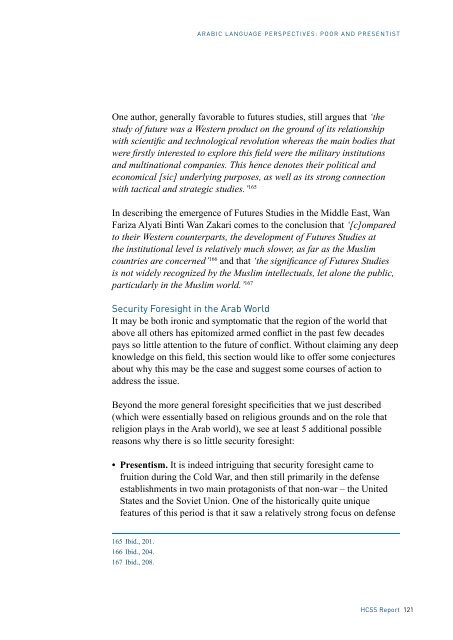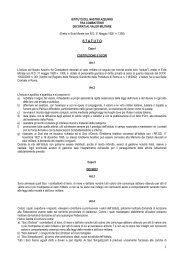Contours of Conflict in the 21st Century
Contours of Conflict in the 21st Century
Contours of Conflict in the 21st Century
- No tags were found...
You also want an ePaper? Increase the reach of your titles
YUMPU automatically turns print PDFs into web optimized ePapers that Google loves.
ARABIC LANGUAGE PERSPECTIVES: POOR AND PRESENTISTOne author, generally favorable to futures studies, still argues that ‘<strong>the</strong>study <strong>of</strong> future was a Western product on <strong>the</strong> ground <strong>of</strong> its relationshipwith scientific and technological revolution whereas <strong>the</strong> ma<strong>in</strong> bodies thatwere firstly <strong>in</strong>terested to explore this field were <strong>the</strong> military <strong>in</strong>stitutionsand mult<strong>in</strong>ational companies. This hence denotes <strong>the</strong>ir political andeconomical [sic] underly<strong>in</strong>g purposes, as well as its strong connectionwith tactical and strategic studies.’ 165In describ<strong>in</strong>g <strong>the</strong> emergence <strong>of</strong> Futures Studies <strong>in</strong> <strong>the</strong> Middle East, WanFariza Alyati B<strong>in</strong>ti Wan Zakari comes to <strong>the</strong> conclusion that ‘[c]omparedto <strong>the</strong>ir Western counterparts, <strong>the</strong> development <strong>of</strong> Futures Studies at<strong>the</strong> <strong>in</strong>stitutional level is relatively much slower, as far as <strong>the</strong> Muslimcountries are concerned’ 166 and that ‘<strong>the</strong> significance <strong>of</strong> Futures Studiesis not widely recognized by <strong>the</strong> Muslim <strong>in</strong>tellectuals, let alone <strong>the</strong> public,particularly <strong>in</strong> <strong>the</strong> Muslim world.’ 167Security Foresight <strong>in</strong> <strong>the</strong> Arab WorldIt may be both ironic and symptomatic that <strong>the</strong> region <strong>of</strong> <strong>the</strong> world thatabove all o<strong>the</strong>rs has epitomized armed conflict <strong>in</strong> <strong>the</strong> past few decadespays so little attention to <strong>the</strong> future <strong>of</strong> conflict. Without claim<strong>in</strong>g any deepknowledge on this field, this section would like to <strong>of</strong>fer some conjecturesabout why this may be <strong>the</strong> case and suggest some courses <strong>of</strong> action toaddress <strong>the</strong> issue.Beyond <strong>the</strong> more general foresight specificities that we just described(which were essentially based on religious grounds and on <strong>the</strong> role thatreligion plays <strong>in</strong> <strong>the</strong> Arab world), we see at least 5 additional possiblereasons why <strong>the</strong>re is so little security foresight:• Presentism. It is <strong>in</strong>deed <strong>in</strong>trigu<strong>in</strong>g that security foresight came t<strong>of</strong>ruition dur<strong>in</strong>g <strong>the</strong> Cold War, and <strong>the</strong>n still primarily <strong>in</strong> <strong>the</strong> defenseestablishments <strong>in</strong> two ma<strong>in</strong> protagonists <strong>of</strong> that non-war – <strong>the</strong> UnitedStates and <strong>the</strong> Soviet Union. One <strong>of</strong> <strong>the</strong> historically quite uniquefeatures <strong>of</strong> this period is that it saw a relatively strong focus on defense165 Ibid., 201.166 Ibid., 204.167 Ibid., 208.HCSS Report 121










